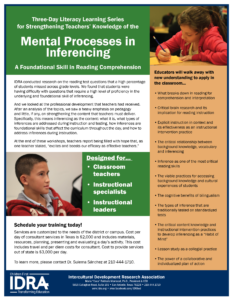• Nilka Avilés, Ed.D. • IDRA Newsletter • January 2020 •


Through IDRA’s multi-year School TurnAround and Reenergizing for Success (STAARS) Leaders project, funded by the U.S. Department of Education, our coaches positively impacted a cluster of schools in San Antonio facing state education agency accreditation consequences.
IDRA brought its decades of experience, expertise and collaboration to 41 campuses through the project’s comprehensive professional development program. Using 2018-19 state accountability results criteria, these 41 campuses likely would have received an F rating without this project. In 2019, the Texas Education Agency assigned a B grade to the district, an increase from a C the previous year. The number of individual schools receiving an F grade dropped from 41 to 16 within a four-year span of time.
In addition, IDRA provided specialized, intensive, differentiated professional development to five low-performing schools with dramatic results. One of the schools not only met the state standard two years ago, it gained a designated distinction in Academic Achievement in Science twice. The state recognized the campus for Postsecondary Readiness as well.
An elementary school met the state standard in 2018 and gained designated distinction in Academic Achievement in Mathematics, Academic Achievement in Science, and Top 25 Percent: Comparative Academic Growth. Another elementary met the state standard in 2018 and gained designated distinction in the Top 25 Percent: Comparative Academic Growth. In 2019, a high school also received a distinction recognition.
The schools serve a sizeable English learner population whose performance on the state assessment test showed substantive improvement in all subjects at the end of IDRA’s project period. The high school improved by 14 percentage points. A middle school improved by 5 percentage points. And two elementary schools improved by 26 percentage points each.
When we asked principals to comment on the impact of the project’s activities on success in turning around campuses, they named three major project activities:
- IDRA’s coaching and mentoring, which enabled “principals to have a sounding board, share ideas, express concerns and allow for the mentor to provide a different lens on addressing issues and challenges on campus;”
- IDRA’s professional development, which focused on “inferential skill development,” led to significant improvement on the state assessment and contributed to project schools’ success (Avilés, 2018b); and
- The project’s campus leadership certification program, which added more than 24 certified principals who were specifically trained to work in urban schools with a diverse student body.
IDRA’s unique model for school improvement demonstrated that coaching and supporting campus leadership leads to cohesive, meaningful change for struggling schools.
The transformation begins on Day 1. In the initial meeting, we work with the principal and leadership team to outline how our coaching process will integrate with campus activities and identify students’ academic needs and leaders’ individual needs for professional growth.
Coaches then visit the school to become acquainted with the school faculty, get a sense of the school climate, and observe various operations of the school. Coaches and school leaders review the school’s data and conduct classroom observations together. The observations have a specific focus on the identified teacher needs, such as student engagement, teacher content knowledge and classroom management.
Our coaches then sit down with the principal to debrief and compare notes. We then develop a plan of action to address the feedback and coaching that needs to follow. The plan includes professional development needed by individuals or groups of teachers.
Podcasts about IDRA’s Coaching Model
Coaching and Mentoring New Teachers – Episode 24
Growth Mindsets to Increase Achievement – Episode 180
Capacity Building Among School Leadership – Episode 177
A Principal on Leadership for a Turnaround School – Part 1 – Episodes 168
A Principal on Leadership for a Turnaround School – Part 2 – Episodes 169
Most of the professional development activities focus on areas of concern for reframing instruction and its delivery to a diverse population as identified though IDRA’s analysis of student and teacher performance. A unique component IDRA offers is classroom demonstrations with the teachers’ own students while teachers observe how their students interact with the lesson and show evidence of mastery of concepts. Debriefing sessions follow where coaches and teachers discuss what they learned and how to improve teaching and learning practices.
Coaches are non-judgmental throughout the coaching process in order to build the required trust and to support leaders’ capacity-building to guide and manage systemic changes. Kosfin & Haeger (2006) state that an outside school coach, properly prepared and sensitive to individual and whole-school concerns, can provide a balance of pressure and support to sustain meaningful school improvement.
When certain practices do not work or when addressing specific challenges, we engage in conversations to perform a root cause analysis of the issues at hand. It is paramount that teachers have space to take risks in sharing innovative ideas to increase achievement. Coaches, leaders and teachers ensure that the school vision becomes a reality by targeting priorities in the curriculum to increase students’ mastery of skills and by making decisions to impact students’ progress.
A leadership coach’s essential goal is to ensure that the school organization works in harmony and that students reap the benefits from their school experiences. Effective school improvement coaches use two lenses: the asset-based lens and the social justice and equity lens. They examine the data to point to equity gaps, resource gaps and opportunity gaps, and they monitor the power dynamics present at the school.
Such coaching activities also help hold educators accountable for the actions they commit to do while establishing new strategies. As a catalyst for change, coaches are readily available to collaborate and provide resources to engage others to take action.
Following are some of the outcomes of coaching and mentoring that, if put in place with fidelity, will positively improve students’ academic achievement:
- A new or renewed culture of valuing beliefs and attitudes;
- Enhanced people skills;
- Improved organizational efficiency and effectiveness;
- New internal and external networks;
- Habits for addressing internal and external conflicts;
- A system for planning, implementing and assessing school innovations and interventions; and
- An internal accountability system that guarantees transparency and respect for individual differences.
Since every school is unique, skilled coaches can lead educators to reflect on their own school and instruction and to strengthen their individual leadership competencies.
IDRA’s school improvement coaches are available to work with district and campus leadership teams to help them polish their own skillsets and take practical steps to raise student academic achievement through reflective practices. IDRA’s coaching and mentoring is aligned to the Professional Standards for Educational Leaders, grounded in current research and the real-life experiences of educational leaders to meet the needs of schools and students.
Resources
Avilés, N. (March 2018). “School Leaders Create Culture of Equity and Success,” IDRA Newsletter.
Avilés, N. (September 2018). “School Leaders Improve English Learner Literacy with Focus on Inferencing,” IDRA Newsletter.
Kostin, M., & Haeger, J. (2006, May). “Coaching Schools to Sustain Improvement,” Education Digest, 71(9), 29-33.
Laba, K. (2011). Coaching for School Improvement: A Guide for Coaches and Their Supervisors. Lincoln, Ill: Academic Development Institute Center on Innovation and Improvement.
Nilka Avilés, Ed.D., is an IDRA senior education associate and directed IDRA’s STAARS Leaders project and co-directs IDRA’s Re-Energize project. Comments and questions may be directed to her via email at nilka.aviles@idra.org.
[©2020, IDRA. This article originally appeared in the January 2020 IDRA Newsletter by the Intercultural Development Research Association. Permission to reproduce this article is granted provided the article is reprinted in its entirety and proper credit is given to IDRA and the author.]




